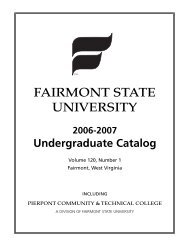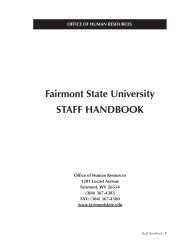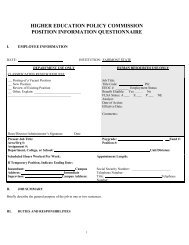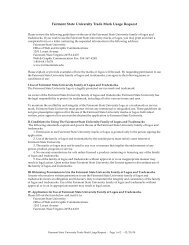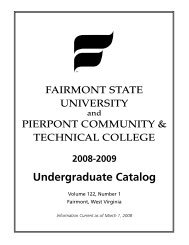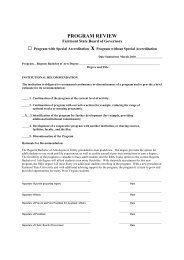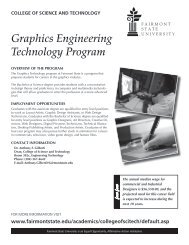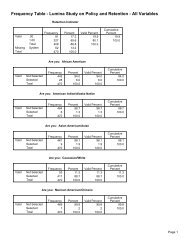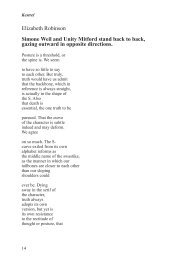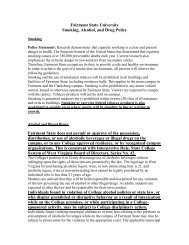Faculty Handbook - Fairmont State University
Faculty Handbook - Fairmont State University
Faculty Handbook - Fairmont State University
Create successful ePaper yourself
Turn your PDF publications into a flip-book with our unique Google optimized e-Paper software.
speak or write as citizens outside the institution, they shall be free from institutional<br />
censorship or discipline.<br />
2.3. The concept of academic freedom is accompanied by an equally important concept of<br />
academic responsibility. The faculty member at a public institution of higher<br />
education in West Virginia is a citizen, a member of a learned profession, and a<br />
representative of an educational institution. As such, a faculty member, together with<br />
all other members of the academic community, has the responsibility for protecting,<br />
defending, and promoting individual academic freedom for all members of the<br />
community. The faculty member has the responsibility of contributing to institutional<br />
and departmental missions in teaching, research, and service as defined by the<br />
institution. The faculty member is responsible also as a teacher for striving to speak<br />
with accuracy and with respect for the similar rights and responsibilities of others. In<br />
speaking only as an individual or for a limited group, the faculty member should not<br />
imply or claim to be a spokesperson for the institution in which he or she holds an<br />
appointment.<br />
2.4. In addition to meeting the primary responsibilities of addressing institutional<br />
missions in teaching, research, and service as defined by the institution, all faculty<br />
have an obligation to foster the quality, viability, and necessity of their programs. The<br />
financial stability of a program and recruitment of an adequate number of students<br />
depend in part on the faculty. The common goal of quality must be nurtured and<br />
responsibility for it shared by all. Integrity, objectivity, and service to the purposes<br />
and missions of the institution are expected.<br />
2.5. <strong>Faculty</strong> interests and skills change, disciplines evolve, and new professions or fields of<br />
study emerge. All faculty members are responsible for remaining current in their<br />
disciplines. All are encouraged to explore opportunities for further developing a<br />
versatile range of knowledge and skills that are important to the institution. Through<br />
individual initiative and faculty development programs, faculty members are<br />
encouraged to grow in competency in their own disciplines and strengthen their<br />
interests in related fields.<br />
2.6. As members of an academic community, faculty members also are expected to<br />
participate in decisions concerning programs and in program-review processes.<br />
SECTION 3. FACULTY: RANKS AND DEFINITIONS.<br />
3.1. The faculty at any state institution of higher education shall be those appointees of the<br />
institution’s designee. The faculty are those so designated by the institution and may<br />
include, but are not limited to, such professional personnel as librarians, faculty<br />
equivalents, academic professionals, and those involved in off-campus academic<br />
activities.<br />
3.2. <strong>Faculty</strong> may fall into one of the following classifications:<br />
3.2.1. Tenured: Those faculty members who have attained tenure status as<br />
determined by the institution. Normally, tenured appointments are full-time<br />
(1.00 FTE or the equivalent, as determined by the institution) for the<br />
academic year.<br />
3.2.1.1. Under special circumstances, if requested by the faculty member<br />
and approved, a full-time tenured appointment may be converted<br />
to a part-time tenured appointment for a specified time period,<br />
normally not to exceed one calendar year. At the conclusion of the<br />
approved time period or an approved extension thereof, the<br />
faculty member will return to a full-time tenured appointment or,<br />
if the faculty member chooses not to return to a full-time tenured<br />
appointment, the faculty member's employment will cease. This<br />
77



